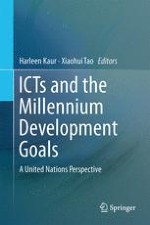2014 | OriginalPaper | Buchkapitel
8. Incorporating ICTs in Schools for Effective Education: Challenges and Prospects
verfasst von : Vivian Ogochukwu Nwaocha
Erschienen in: ICTs and the Millennium Development Goals
Verlag: Springer US
Aktivieren Sie unsere intelligente Suche, um passende Fachinhalte oder Patente zu finden.
Wählen Sie Textabschnitte aus um mit Künstlicher Intelligenz passenden Patente zu finden. powered by
Markieren Sie Textabschnitte, um KI-gestützt weitere passende Inhalte zu finden. powered by
